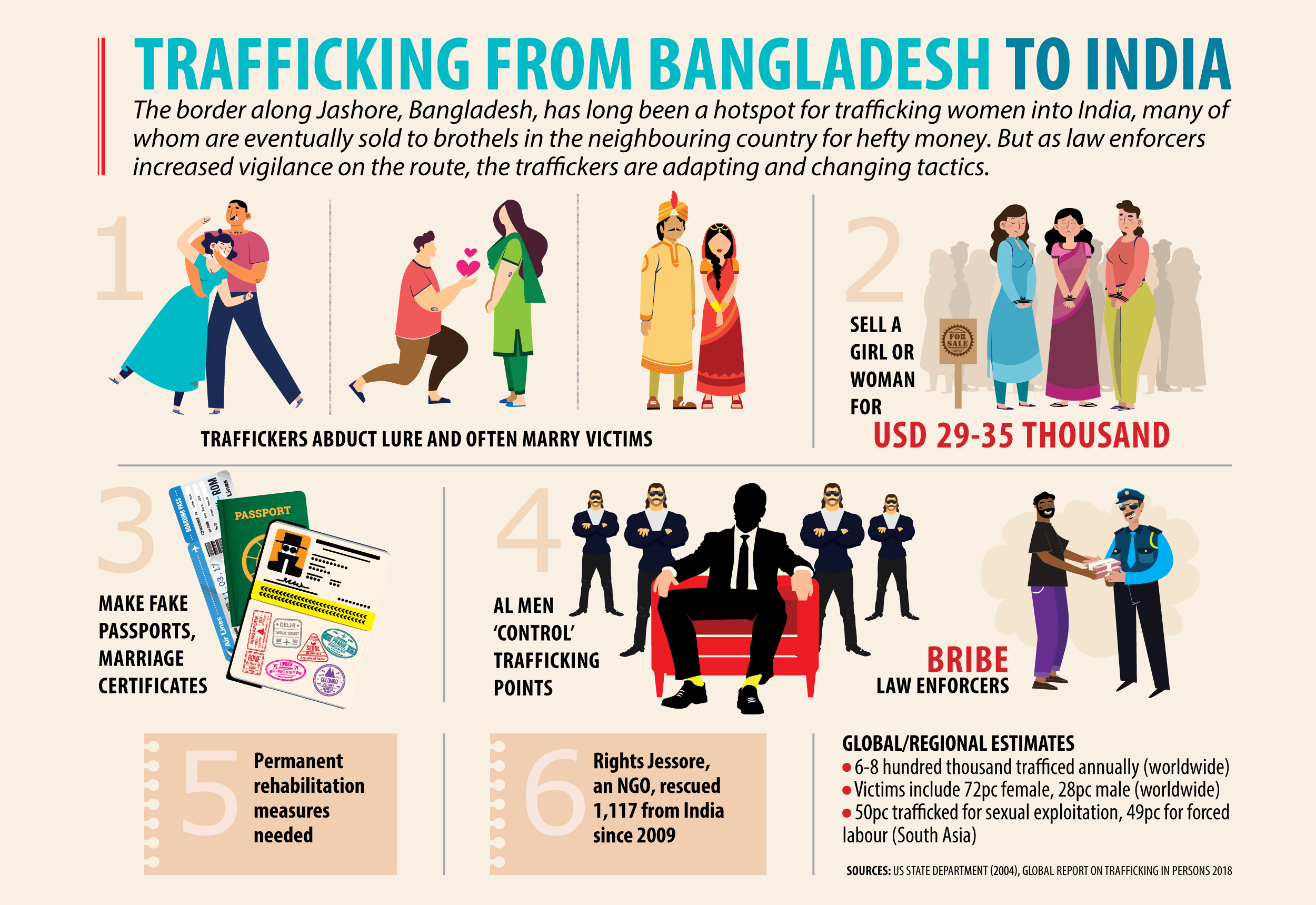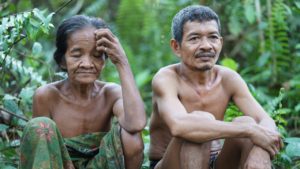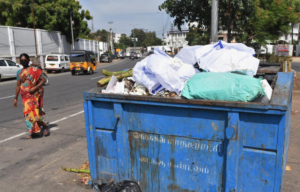Local agents have been smuggling victims across Benapole’s border by showing forged documents of family relations at immigration checkpoints. Sometimes the gang members marry the victims only to sell them into prostitution later.
The Daily Star learned about this after talking to six victims and law enforcers in bordering areas recently.
In most cases, the victims from different parts of the country are gathered at small huts built by the traffickers near Benapole border. At that point, they are treated nicely and given the impression that they would actually go to India for a better future.
When it is time, their counterparts in India would notify their accomplices, and the victims are taken to the other side of the border.
For commuting, the traffickers always use motorbikes just as locals in border areas do, and carry sweetmeat, fish or gift packets to avoid drawing suspicion.
TRAFFICKING ROUTES
According to victims and local law enforcers, the traffickers use Putkhali, Sadipur, Boroachra, and Gathipara points of Jashore to traffic the victims into India without passports.
The victims are first taken to Jashore and then to the border points by motorbike before they are kept in the small huts.
Rights activists said the gang sells a woman or girl to Indian brothels for Tk 2.5 to 3 million.
Take the case of victim Bonya (not her real name).
The 17-year-old girl used to live with her parents in the capital’s Mirpur and was looking for a job after completing higher secondary education. She left home after a woman, her neighbour, promised her a better job in India.
On Jan 28, 2017, she went to Jashore by bus with the woman’s boyfriend. From Jashore town, they went to Benapole by motorbike.
“For the next five days, the man kept me in a small hut with a TV, almirah (a cupboard) and small bed,” Bonya said, talking to The Daily Star in Jashore town after her rescue.
“The man asked me to stay inside the hut and went away. I was not allowed to go outside for security reason, and a woman gave me food timely.”
Bonya come back home in March last year with the support of Rights Jessore, a human rights organisation.
“On Feb 5, the man came back early in the morning and took me near Putkhali where a boat was waiting for me,” she said.
“After crossing the river, I found a man with a motorbike. He drove me into a dense forest. One hour later, I saw a locality.”
In the area, Bonya was kept in a house and forced to sleep with some men, she said. “After a few days, I was being taken to a brothel area. On the way, I ran from them and went to the local police.”
Police then sent Bonya to a shelter home in West Bengal, and she finally made contact with Rights Jessore from there.
This reporter recently visited Putkhali in Benapole, and met a person called Sagar with the help of a local man while posing as a client.
During the conversation about how to cross the border without a passport, Sagar said he could make the arrangement, but it would cost Tk 5,000 (US$59.13) because “border security has been heightened recently.”
When asked if there were two persons including a woman, Sagar grinned and said he could arrange that too, but the cost would go up to Tk 16,000. “We charge extra for women because it is risky, and it takes time.”
After the correspondent agreed, Sagar said, “You need to stay near the border for one day or two. We will first clear the border for you and then help you cross it.”
Sagar demanded an additional Tk 300 for every overnight stay and Tk 200 for food at the hut. He also advised the correspondent to carry some additional cash to buy sweetmeat or fruit on the way.
CONTROLLING BORDER POINTS
Locals and law enforcers said each of the border points is run by local ruling party men. They pay hefty amounts to law enforcers to run the trafficking activities smoothly.
Executive Director of Rights Jessore Binoy Krishna Mallick said, “We have learnt from rescued victims and our local network that some people are leading the nexus at border points using political identity.”
At present, one Ghana Biswas oversees the Putkhali point, Ashok Sen the Boroachra point, and Jahidul Islam the Sadipur point of Benapole, The Daily Star learned after talking to some accomplices of the gangs and sources of law enforcement agencies.
All of them are supporters of the Awami League and have been involved in human trafficking for years, but were never arrested, the sources said. Locally, they are known as farmers despite owning luxurious multi-storey homes in nearby Sharshaupazila, they added.
“In the same way, the traffickers get passports for underage girls. They identify them as children or siblings while making fake passports and documents,”
The Daily Star tried to communicate with them but their phones were switched off.
Rights activists said the gang sells a woman or girl to Indian brothels for Tk 2.5 to 3 million.
Asked about the alleged complicity of the ruling party men, Awami League’s Benapole unit President Enamul Hoque Mukul said some may get involved, but they are doing it in secret.
“We take strict action against whoever is found guilty.”
He said the law enforcers have tightened security, and the situation is improving now.
Asked about AL men’s involvement, lieutenant-colonel Selim Reza, commander of Border Guard Bangladesh-49 (BGB), refused to give a direct reply.
He, however, said they take action against those found involved in the crime. “The situation has got better now, and the number of trafficking incidents has come down to almost zero for our increased vigilance and action.”
Salauddin Sikder, additional police superintendent of Jessore, said trafficking through the border declined in recent years although there were still some reports of trafficking.
He said he had no specific information about law enforcers’ involvement in the crime but warned of action if any member of the force was found guilty.
NEW TECHNIQUES
In recent times, the traffickers have changed techniques. Now they get their prey across the border using the “legal” channel.
“For a woman, the traffickers make fake documents like a marriage certificate and a passport. Then they cross the border like a couple going on a trip to India,” Masud Karim, officer-in-charge of Benapole Police Station, told The Daily Star.
“In the same way, the traffickers get passports for underage girls. They identify them as children or siblings while making fake passports and documents,” said the OC, who claimed to have got the information after interrogating victims.
Now few victims cross the border illegally, he said. “Some are still doing it without passports, but most of them have relatives in India, or they are sick and poor.”
“We charge extra for women because it is risky, and it takes time.”
Asked about raiding the border huts, the OC said they often conduct drives and take action against the criminals. Sometimes, they also rescue victims from the huts.
FAKE RELATIONS
There are some cases in which traffickers marry a girl before selling her to a brothel in India.
On January 18 last year, a Jashore court sentenced one Shohag Hossain of Narail for life and fined him Tk 50,000 for selling his wife to a brothel in Mumbai.
Shohag married the girl of Jashore Sadarupazila on July 7, 2007. Later, he told his in-laws that he would take his wife to India for a better job. The girl’s family refused but he kept insisting, the victim’s family told The Daily Star in May last year.
Finally, Shohag went to India with his wife on April 15, 2009, without letting anyone know. When her family found him missing, they filed a complaint with police and went to Rights Jessore. A few days later, Shohag came back home alone, and said his wife went missing in India.
Rights Jessore rescued the girl from a Mumbai brothel on May 7, 2010, using its network.
This story by Mohammad Jamil Khan was originally published by The Daily Star on Jul 22.
The reporter had to act as a local to get in touch with gang members who ran the trafficking trade, in order to acquire information pertaining to the story. Social workers and law enforcement sources, who worked with the trafficked victims, helped clue him in on the gang members tasks and whereabouts. However, he did not get much data or support from the local law enforcers. While working in the field, he convinced locals to help him cross Benapole’s borders without a passport by paying them sums of money. The NGOs who used to work to rescue traffic victims also assisted him in getting some ideas and provided him a database of contacts. As local political leaders were benefiting from the trafficking trade, the reporter was forced to hide his identity while staying in the bordering village. The social workers, who helped him throughout his investigation, alerted him to a possible threat from a political muscleman. After the story published, the reporter received dozens of phone calls congratulating him on the findings. To his knowledge, although illegal human trafficking is still underway through bordering points, the number of trafficking cases has reduced significantly.




